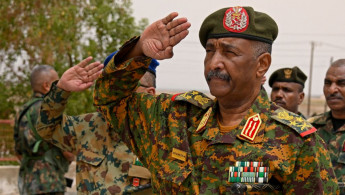Sudan army chief Burhan heads to Egypt on first trip abroad since conflict
Sudan's army chief Abdel Fattah Al-Burhan departed on Tuesday on a flight to Egypt for his first trip abroad since fighting began with paramilitaries in April, the country's ruling Sovereign Council said.
General Burhan would hold talks with Egyptian President Abdel Fattah Al-Sisi "on the latest developments in Sudan and bilateral ties between the two countries", the council said in a statement.
Burhan, who heads the council, was accompanied by intelligence chief Ahmad Ibrahim Muffadal and interim foreign minister Ali Al-Sadeq, it added.
The war between Burhan and his former deputy turned rival Mohamed Hamdan Daglo, who commands the paramilitary Rapid Support Forces (RSF), has raged since 15 April.
It has spread from Khartoum and the western region of Darfur to Kordofan and Jazira state, killing thousands and forcing millions to flee their homes.
For months, the RSF had besieged Burhan inside military headquarters in Khartoum, but last week the army chief made his first public foray outside the compound to review troops in parts of the war-scarred country.
On Monday, he was in the Red Sea city of Port Sudan where he made a fiery address to troops, vowing to fight the RSF who he branded mercenaries to "end the rebellion".
"We are mobilising everywhere to defeat this rebellion, defeat this treason, by these mercenaries who come from all over the world," Burhan told cheering troops.
"There is no time for discussion now. We are concentrating all our efforts on the war, to put an end to the rebellion," he said.
His comments came a day after Daglo released a statement detailing a 10-point "vision" to end the war and build "a new state".
The plan calls for "civilian rule based on democratic norms" and "a single, professional, national military institution" – the very sticking point which turned the former allies into rivals.
Conservative estimates from the Armed Conflict Location & Event Data project show that nearly 5,000 people have been killed in the conflict.
But the real figure is thought to be much higher, and the United Nations says more than 4.6 million people have been displaced by the fighting both inside and outside Sudan.
Several efforts to mediate an end to the conflict, mainly by Saudi Arabia and the United States, have failed.
In July, Egypt, which shares borders with Sudan and has experienced an influx of refugees from its neighbour, hosted a crisis meeting attended by African leaders to seek a solution.





 Follow the Middle East's top stories in English at The New Arab on Google News
Follow the Middle East's top stories in English at The New Arab on Google News


